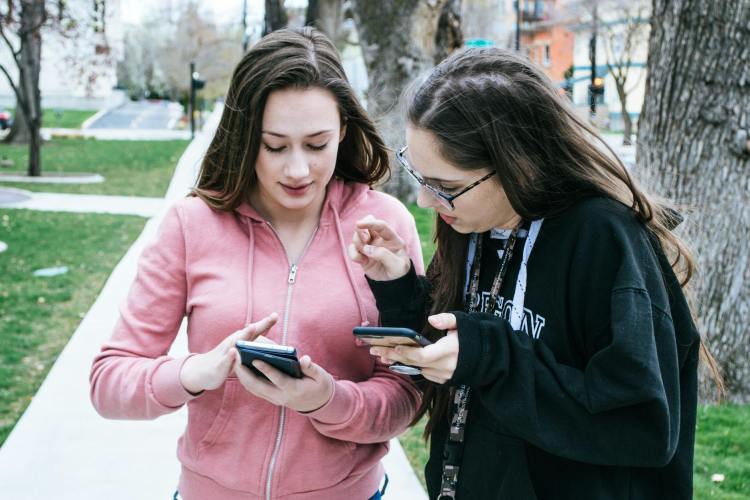How can parents talk to kids about digital footprints so they actually listen? How can caregivers explore online reputations in a way that connects with teens? This post explores these questions and more.
Many parents are concerned that their child or teen might post something they later regret or that will negatively impact their future. After all, it’s common practice for employers and colleges to search applicants online to learn more about them. Nearly 65% of the admissions officers surveyed by Kaplan in 2020 saw no issue with social media being part of the admissions equation.

Luckily, 42% of these colleges say that what they found positively impacted prospective students. On the flip side, 58% reported that what they found had a negative impact.
Talking to kids about digital footprints is important but tricky for parents. It’s easy for these conversations to turn into lectures, increasing the likelihood that kids tune them out. Here are some tips to help.

Ways to Help Kids Understand Digital Footprints
- Start Early: Even young children can understand the concept of digital footprints. Begin by helping them learn the term digital footprint, which is defined as public information about someone that lives on the internet as a result of their online activity. Kids might not realize that anything they post, share, like, or comment on contributes to their footprint.
- Share Relatable Examples: Instead of sharing abstract concepts, sit next to them and explore some of their favorite sites, games, or shows. Ask about a character or person who has a positive or negative online presence. Look at these images and posts together. Ask them how they would like to shape their own digital footprint.
- Search Your Name and See What Comes Up: Kids might be surprised to see they already have a digital footprint. While sitting together, type your names into a search engine and see what pops up. Talk about what you find and how it makes them feel.
- Be a Role Model: Kids learn by example. Show them you take privacy seriously. Be mindful of what you post about yourself, and ask their permission before sharing photos or information about them. Discuss moments when you decided to take some of your conversations offline because they were better handled privately or in-person.
- Focus on Positive Choices: Instead of saying “don’t do that,” talk about what good digital citizenship looks like. Encourage them to be kind and respectful online. Before sharing something, they can ask themselves: Is it kind? Is it true? Would I want my grandma to see it?
- Make It a Conversation: Two-way conversations work better than lectures. Ask about what they like and dislike about their favorite online spaces. Listen to their experiences and concerns to better understand what they are doing and seeing online.
- Teach About Privacy Settings: Show them how to adjust privacy settings on social media and other apps. Choosing strong passwords and deleting apps they no longer use are important ways to protect their information online.
By talking to your kids early and often, you help them develop healthy habits for managing their digital footprint. Starting with curiosity rather than judgment helps to keep conversations engaging and helpful. This also makes it more likely that your child will come to you for help when mistakes are made, they have questions or need help.
ABOUT JESSICA SPEER:
Jessica Speer is the award-winning author of books for kids and teens, including The Phone Book – Stay Safe, Be Smart, and Make the World Better with the Powerful Device in Your Hand, BFF or NRF (Not Really Friends)? A Girls Guide to Happy Friendships and Middle School – Safety Goggles Advised. Blending social science, stories, and activities, her writing unpacks tricky stuff that surfaces during childhood and adolescence. She has a Master’s Degree in Social Sciences and a knack for writing about complex topics in ways that connect with kids and teens. Jessica regularly contributes to media outlets on content related to kids, parenting, friendship, and screens.